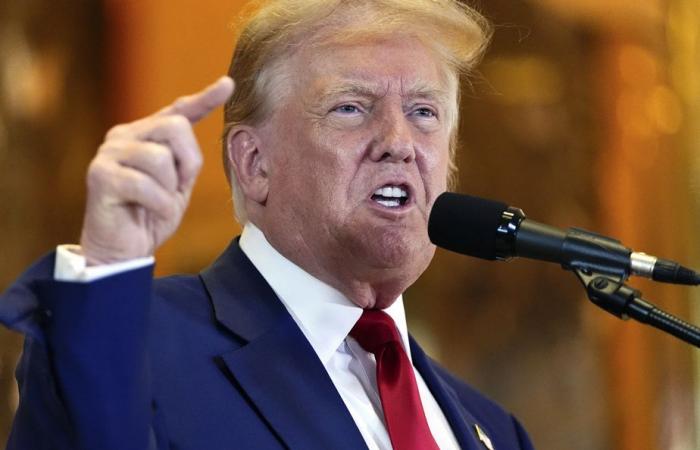Canada could have stood up more firmly to Donald Trump, whose threat to impose 25% tariffs on all Canadian products led the Trudeau government to announce major investments to strengthen its border, according to experts interviewed by La Presse Canadian.
Posted at 5:49 p.m.
Pierre Saint-Arnaud
The Canadian Press
The simple fact of requiring Canada to strengthen the border to slow down the entry of migrants and drugs into the United States “is not normal, it is not the norm, it is even, in terms of very questionable legal status,” says Charles-Philippe David, president of the Observatory on the United States.
“It’s to give Donald Trump the impression of winning,” notes the founder of the Raoul-Dandurand Chair at UQAM.
Donald Trump only considers zero-sum games in his interactions, his transactions with individuals, businesses, states, the entire world. So we don’t escape it, even if we are neighbors who should have a little more consideration than that, he perceives our relationship as a zero-sum game.
Charles-Philippe David, president of the Observatory on the United States
Pierre Martin, political scientist and specialist in American politics at the University of Montreal, uses almost the same words: “It’s a way for him to say that he won, that Canada reacted and he is going to declare himself the winner. and therefore brag about himself by saying that his maximalist policy yielded something, that he only had to make demands and Canada immediately jumped to attention to respond to his demands. »
Canada’s responsibility
Mr. Martin, however, brings a nuance: it is indeed legitimate for a State to ask a neighboring State to control its borders. “There is a certain dimension of what is requested which may indeed be under the jurisdiction of Canada. Migrants could, in Mr. Trump’s perception, easily cross into Canada with the aim of entering the United States because the Canada-U.S. border is relatively porous. Migrants who enter Canada without too much difficulty could therefore be a source of potential migrants to the United States. The request, if you like, is to strengthen controls in order to avoid this migration route to the United States. »
And if Christian Deblock, researcher at the Center for Studies on Integration and Globalization at UQAM, describes the American request as “unusual”, he in turn recalls that at a border, “we should still not “not lose sight of the fact that there are two countries which are equal in law and therefore each partner, each of the two countries, is supposed to see that security at the border is respected.”
Canada and the United States are also linked by an unwritten agreement known as the Kingston Oath, based on the declarations in 1938 of President Franklin Delano Roosevelt and Prime Minister William Lyon Mackenzie King, under which the Canada benefits, if threatened, from the protection of the United States and ensures, in exchange, protection against threats that could be directed against the United States from its own territory.
However, the Canadian plan to strengthen border security announced Tuesday, which amounts to 1.3 billion over six years, includes major investments in monitoring the land border, through which no migrants or drugs enter Canada. intended for the United States.
Migrants who enter the United States illegally arrive in Canada by plane and drugs, mainly by boat. The addition of helicopters and drones for land border surveillance, for example, therefore mainly supports American border services.
Aplaventrisme
Charles-Philippe David does not mince his words in the face of Canada’s eagerness to respond to Donald Trump’s demands: “I have the impression that we have given in, that we are playing aplaventrism to try to win his favors . Bullies cannot be won by being moderate or too diplomatic. We cannot appease Donald Trump. » The simple fact that Justin Trudeau went so quickly to Mar-a-Lago to meet the president-elect, “it looks a bit like the king’s court where everyone passes by to kiss hands and keep the favor of the leader », he imagines.
Christian Deblock underlines that the new strong man, even if he has not yet entered the White House, “has always worked like that, that is to say that he uses pressure initially to scare people. to the partner and then adjusts. It is a negotiating argument, a balance of power that Trump seeks to establish with Canada, as he has always done.
“It’s a way of making demands that are clearly exaggerated or maximalist to get Canada moving,” argues Pierre Martin. But these are issues where we cannot easily measure the result. Because, whether for irregular migrants or for illegal substances, how can we know if the request had a result or not? Yes, these are things that we will be able to measure in the very long term on a certain number of indicators, but it will be difficult for anyone to brandish a result which would justify the lifting of tariffs.
Ally with Mexico
However, says Charles-Philippe David, it would have been possible to resist: “The way to stand up would have been to ally with Mexico and say, we are two partners out of three in this who tell you: We can’t take that route, all three of us will ruin ourselves. But that would have taken balls. » He deplores that Canadian politicians, including Ontario Prime Minister Doug Ford, have thrown Mexico under the bus: “It’s serious, because it’s still a defection. And who benefits? Well yes, the one who perceives all this as a zero-sum game. »
“I think we would have been much better off if we stood together with Mexico and said, all right, in this zero-sum game, if you decide that you impose an additional tariff, know that half of your agricultural products, know that half of your automotive products in the sector especially “pickups”, you will have to pay a surcharge that we will impose on you in these two areas. You will see that American consumers will not be happy at all – and I haven’t even mentioned oil or natural gas. »
The three researchers expect to see exactly the same intimidation tactics when it comes time to discuss Canada’s financial obligations to NATO or review CUSMA (Canada-United States-Mexico Free Trade Agreement). ).
And none of them are surprised to see Donald Trump make fun of Justin Trudeau by calling him the governor of the 51e American state.
Invitation to escalate bullying
In a York University publication a week ago, Professor Ilan Kapoor, a specialist in psychoanalytic theory in politics, and his fellow St. Mary’s University political scientist Gavin Fridell, wrote that “for Canada, it is unlikely that appeasing Donald Trump or betraying Mexico will have an effect on the president-elect. On the contrary, these efforts could well be seen as evidence that more intimidation will be required to extract even more concessions. Mr. Trump’s recent provocations against Mr. Trudeau prove, in fact, that escalating intimidation will be a constant presidential tactic in the months and years to come. »
“The property of bully or the bully, is to detect the weakness of his counterpart. And it’s clear that right now, Justin Trudeau is weakened and in an extraordinarily precarious political situation. Trump senses this vulnerability and he will exploit it, notes Pierre Martin. The best thing you can do in a situation like this is just to let it flow, not to get upset about it. The more we feel offended and especially the more we project this indignation and express it, for him, it is a sort of reward to provoke, arouse indignation among his Canadian counterparts. If we let it go, if we don’t talk about it, it has no effect. »
“A born bully, proven”
“It’s in Donald Trump’s DNA,” adds Charles-Philippe David. He is like that and he was like that during the 2016 Republican primaries and he still is to this day. He’s a born bully, proven. Obviously, we take it personally because he is our prime minister, but he is the same with so many others. »
For Christian Deblock, these mockeries of Canada and its Prime Minister “are part of the provocation. It’s a gratuitous provocation, but it’s a provocation nonetheless to annoy the government. But you notice that no one responded. It’s also good by the way. »
In fact, it’s only the media that talk about it, notes Pierre Martin with amusement: “The fact that you talk about it – as a journalist obviously it’s your job – but you’re falling into his game.”






